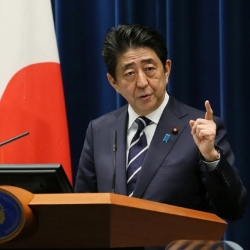Addiction Concerns Over Japan’s Casino Legalization

Prime Minster Shinzo Abe has seized on a new distribution of power in the country’s legislative branch to finally legalize casinos in Japan. He and his supporters now hope that the move will bring in much-needed tax revenues to fill the country’s coffers, and reinvigorate its economy. For those who have favored a loosening of Japanese gambling laws, the law is being hailed as a victory, but nevertheless many people have expressed concern over what social ills may come with the arrival of Japan’s first legalized casinos.
5.36M Japanese Gambling Addicts
Although casinos were illegal until recently, betting on bicycle and horse racing, pachinko and lotteries have long been legal in Japan. The Japanese Ministry of Health estimates that currently 5.36 million Japanese men and women have already become addicted to gambling, with the government agency reporting that women and low-income individuals are most at risk of developing a gambling problem. Stating that the rate of gambling addiction is higher in Japan than anywhere else in the world, the agency is worried that allowing casinos in the country will open Pandora’s box and lead to a rampant escalation in problem gambling.
South Korea a Sobering Case Study
Critics of casino legalization do not have to look far for an example of how casinos can cause a plethora of societal ills. South Korea, for instance, has a significant problem with gambling addiction, even though the country of 50 million people currently has just one casino open to South Koreans. Called Kangwon Land, and located close to the High1 Ski and Golf Resort, the casino has done well financially, but has led to a major spike in problem gambling.
In fact, it’s estimated that 12,000 South Koreans make more than 50 trips to the casino every year, and that 2,000 South Koreans gamble there more than 100 days out of the year. In the meantime, in the town surrounding the casino, more than 500 homeless gambling addicts panhandle on the streets, trying to get enough money to return back to the gaming tables. Recent articles recount the tales of some of these individuals, such as one unfortunate who lost more than 500 million won and was forced onto the street. Such news stories have added fuel to the flames of outrage that have been sparked in Japan since the new gambling legislation was rushed through and signed into law.
Lucrative Rewards
Like the South Korean government, Prime Minster Shinzo Abe and officials in the Japanese government who supported the casino law are for the most part ignoring concerns. In South Korea, casinos have proven to be financially beneficial for the government, bringing in more than $615 billion won (US$5.4bn) in tax revenues for the country. Furthermore, the casinos employ thousands of South Koreans, and many fear that closing the venues to address problem gambling would ultimately leave the local communities decimated.
Prime Minster Abe has argued that Japanese casinos will be integrated resorts, full-fledged travel destinations with more to do than just gambling. He says that the entertainment and dining will have appeal beyond gambling, and that he believes that casinos will increase tourism and bolster the economy. Only time will tell if legalizing casinos will prove a smart bet for the country.
Japan’s $20BN Market
According to estimates, Japan’s future casino market could be worth anywhere between $10-$20 billion per year, which has naturally attracted the attention of the world’s biggest international casino companies. One of those is Las Vegas Sands, which already operates the Marina Bay Sands in Singapore, just one of two casino resorts based in the city state. Commenting on the cost of building an integrated casino resort in Japan, LVS CEO Sheldon Adelson stated:
“It’s the holy grail. It’s the ultimate of business opportunities. Singapore was a warm up to this. It would be at least what we paid in Singapore, $6 billion including the land, but it could be as much as $10 billion.”
Other companies lining up to win a contract to build one of two integrated resorts in the country includes MGM Resorts International, Genting Group, Hard Rock International, as well as other operators such as Wynn Resorts, Universal Entertainment Corp, and Melco International Development.








